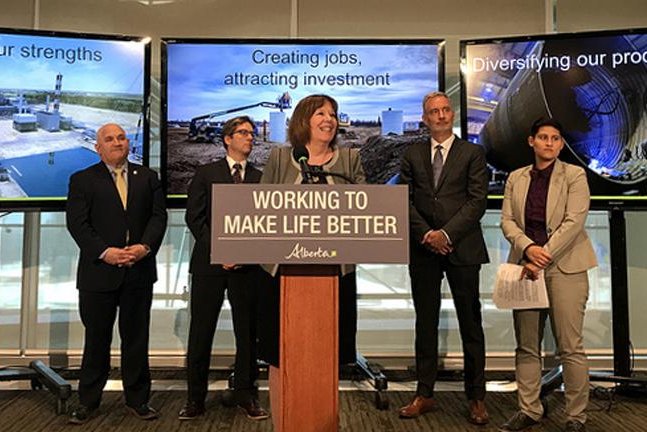Alberta's Energy Minister Margaret McCuaig-Boyd lays out plans to support the largest manufacturing sector in the province with a $1.5 billion commitment. Photo courtesy of the provincial government of Alberta.
March 13 (UPI) -- Up to $1.5 billion in credits, grants and loans will add diversity in the Alberta energy sector by building up the petrochemicals sector, its government said.
"Adding more value to our raw products at home means more jobs for Albertans and getting top dollar for our resources," Provincial Energy Minister Margaret McCuaig-Boyd said in a statement.
The government said it was committed to up to $1.5 billion (USD) in loan guarantees, grants and royalty credits to expand its petrochemicals sector. Supporting exports at a value of $6.4 billion annually, petrochemicals make up the largest manufacturing sector in the province.
Sourced from natural gas and natural gas liquids, the province aims to build up the facilities and infrastructure necessary to produce more products like butane, ethane and methane. A secondary diversification effort would focus on securing more of the raw components needed in petrochemical manufacturing.
"This is an incredibly courageous move on the part of the Alberta government," Bob Masterson, the CEO of the Chemistry Industry Association of Canada, said.
Emerging from a recession that accompanied historically low crude oil prices, Alberta's economy is now leading the rest of the country in terms of growth, posting gains across all business sectors. It last reported a 4.5 percent gain in gross domestic product, beating the U.S. fourth quarter growth rate in GDP of an annual rate of 2.5 percent.
The oil-rich province was once anticipating an $8 billion deficit and lingering recession because of the downturn in crude oil prices and May 2016 wildfires in the Fort McMurray area that idled about 1 million barrels per day worth of regional oil production.
Faced with a U.S. President Donald Trump who favors more of a protectionist trade policy, the government of Alberta has moved repeatedly to diversity its energy sector. In February, it committed to a process called partial upgrading with an eight-year, $780 million commitment starting in 2019.
Partial upgrading reduces the thickness of the heavier type of crude oil found in the province, which can cut industry costs and improve refinery processing. It also increases the amount of product that can flow through pipelines.















